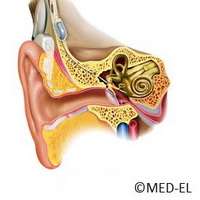Tackling hearing loss

Some 16 per cent of European adults suffer from hearing loss that is severe enough to adversely affect their daily life. Hearing loss impacts on one's ability to communicate - to hear, process sound, and respond - which can make life frustrating. Untreated hearing loss can discourage social interaction, leading to depression, anxiety and isolation from the rest of the world. Sufferers also tend to express greater dissatisfaction with friendships, family life, health and finances. Depression is common in older adults who have trouble hearing.
In the majority of cases, hearing loss is a consequence of ageing or exposure to loud noise, and can be categorised by which part of the auditory system is damaged. There are three basic types of hearing loss: conductive hearing loss, sensorineural hearing loss, and mixed hearing loss. Sensorineural hearing loss is associated with the progressive degeneration of hair cells in the inner ear. This age-related hearing reduction is a natural process, but can be rapid depending on individuals. It usually starts around 35 to 40 years of age. When we reach our 80s, more than half of us suffer from significant hearing loss. Finally, hearing loss can also be inherited (depending on your genetic background) or be the consequence of an illness, medication, or exposure to chemicals.
However, scientists now believe that hearing loss could be conquered in the coming decades. Rapid advances in the bioscience and technology of hearing have made it realistic to envision a cure within the foreseeable future. The project NeuEarn is a one of these new technological advances that has come to life in the last few months.
This FP7-funded three year project was launched in September 2012 and led by a Danish SME called NsGene A/S, which specialises in the development of clinically and EU-compliant therapy devices. The NeuEar project has gathered industrialist and academic partners from Denmark, Sweden, Germany, Austria, UK and the US. The project aims to successfully commercialise this new implant within the next coming year, as it represents clear potential for clinical application. Today, untreated hearing loss costs Europe 213 billion euros a year. This medical condition has created a large worldwide market for cochlear implants, which was worth $725 million in 2008 and is expected to grow to $1.59 billion in 2013.
As indicated, a large proportion of the population is affected by sensorineural hearing loss (SNHL). Sensorineural hearing loss typically occurs following damage and loss of hair cells, the sensory cells in the cochlea of the inner ear, which, in response to sound, convert the mechanical vibrations into nerve impulses in the primary auditory neurons. The only currently available therapeutic intervention for patients suffering from sensorineural hearing loss is the use of a cochlear implant, a neural prosthesis designed to directly electrically stimulate the auditory neurons. With a cochlear implant, the damaged hair cells are bypassed, and the auditory nerve is stimulated directly. The cochlear implant does not result in "restored" or "cured" hearing. It does, however, allow for the perception of the sensation of sound.
Despite improvements in cochlear implant technology, the hearing experience with these devices remains far from normal, partly due to a limited interface with the auditory neurons and their progressive degeneration.
The project NeuEar is developing an implant prototype capable of restoring hearing function and supporting regeneration of the auditory neurons. The implant will rescue the primary auditory neurons from degeneration, and will promote the neuron-electrode interface by creating chronic secretion of neurotrophic factors that would be combined with a cochlear electrode array. In addition, the project will pave the way for a stand-alone neurotrophic implant as a potential regenerative therapy to the inner ear without the use of an electrode.
The implant will not only improve hearing, it will significantly improve the quality of life of people. For those who have been deaf from birth, it does not provide completely 'normal' hearing, but for speech and understanding, it provides an effective stepping stone to a better quality of life.
More information: For more information, please visit: NeuEar - www.neuear.eu/index.html
















